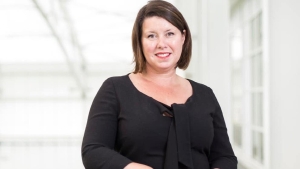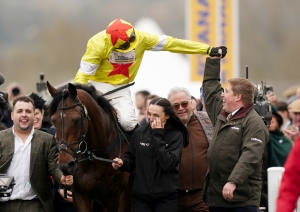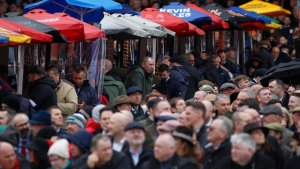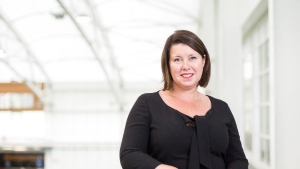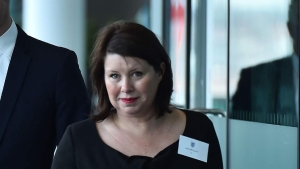British Horseracing Authority chief executive Julie Harrington has warned the dominance of Irish trainers at the Cheltenham Festival is “damaging” for the sport.
Irish handlers won 18 of the 27 races across the four days, with 12 of the 14 Grade One contests also going their way and Willie Mullins accounting for eight of those on his own among an overall tally of nine winners for the Closutton team – a total which also took him over 100 Festival winners.
Dan Skelton flew the flag for Britain by sending out four winners, including a memorable top-level double with Ryanair Chase victor Protektorat and Turners Novices’ Chase hero Grey Dawning on Thursday, with Ben Pauling, Paul Nicholls, Kim Bailey, Jeremy Scott and Fiona Needham also getting on the scoresheet.
While Harrington praised those achievements, she feels the Irish supremacy is “becoming more pronounced”.
She said: “I would like to offer my congratulations to every winner this week, and everyone connected with those horses. We again tip our hat to the Irish, and in particular Willie Mullins whose achievement in reaching 100+ Festival winners is truly remarkable.
“Congratulations also go to the British trainers who secured winners this week, in particular Dan Skelton for his impressive haul.
“I have no doubt that the men and women who train horses here in Britain are more than a match for their Irish counterparts. However, they need the ammunition and at present the balance of power and the best horses are going to our colleagues in Ireland, and in particular one yard.
“This is not a new issue. The direction of travel has been set for a number of years now. The sport has been alive to this and taken measures to seek to address it, through attempting to tackle funding issues associated with the sport, seeking increased investment, looking at the race programme, and more recently the delivery of the recommendations of the Quality Jump Racing Review.
“However, the Irish domination of the Grade One races this week has illustrated that the issue is becoming more pronounced and more damaging for the sport on both sides of the Irish sea.”
Following a nightmare Festival for the home side in 2021 which saw just five winners for British trainers, the BHA set up the review group which made a series of recommendations that were unveiled at the start of 2022, with further tweaks to the fixture list this term in an attempt to improve the upper tier of British National Hunt racing.
However, Harrington concedes more now needs to be done and at a faster pace to ensure no further ground is lost.
She said: “Put simply, the rate of decline of jump racing in Britain at the top end has outstripped the measures that have been put in place to tackle it. We must do more, more quickly, and in a more coordinated and decisive manner if we are going to restore British jump racing to the standing at which it belongs.
“Central to this is the delivery of the industry strategy. The strategy is all about growth. At the core of this is investment in the top echelons of our sport, with a view to incentivising the best horses to be bred, owned, trained and raced on these shores. An additional £3.8million in prize-money has already been earmarked for investment in 2024 across the top end of the sport in both codes.
“The strategy is also about much more than just investing in prize money. We need to grow our fanbase by encouraging new fans and retaining existing fans and owners, improve the experience of ownership and attending and viewing racing, and much more besides.
“To achieve this the sport must work together with urgency and clarity of purpose. The times of being reluctant to embrace change or new ideas, lack of transparency and focusing on narrow self-interest must be put firmly behind us.”
Talks are currently ongoing between the BHA and bookmakers on levy reform, which Harrington believes is another key factor in improving British fortunes in the future.
She concluded: “The very visible deterioration in British racing’s competitiveness with our international colleagues has also been at the heart of our discussions with the betting industry and DCMS around the levy, and our representations to Government around the risk of the damaging impact of affordability checks.
“We have seen great progress in the last 18 months and a spirit of collaboration is clearly developing. I am confident that if the sport and its allies work together around this shared goal then it can flourish once again. Not just across four days in March, but across the whole year. Jump racing’s popularity in Britain is immense and its potential limitless.”
























